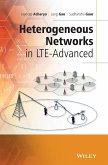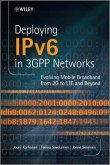4G is the stage of broadband communications that will follow the still-burgeoning third-generation (3G). Now fully updated, this second edition of Advanced Wireless Networks presents a comprehensive integral presentation of the main issues in 4G wireless networks, showing the wide scope and inter-relation between different elements of the networks. It provides systematic coverage of the latest global research results in the field of advanced wireless technology networks at a time when the industry is paving the way for 4G.The book is an essential resource for network planning engineers, consultants, postgraduates, and researchers.
With 40% new material the new edition of Advanced Wireless Networks provides a comprehensive representation of the key issues in 4G wireless networks. Focussing on cognitive, cooperative and opportunistic paradigms to provide further increase in network efficiency, the book explores and addresses issues in wireless internet, mobile cellular and WLAN, as well as sensor, ad hoc, bio-inspired, active and cognitive networks. It examines the problem of cross-layer optimisation and network information theory as well as adaptability and reconfigurability in wireless networks. This book is an integral description of future wireless networks and the interconnection between their elements.
The information is presented in a logical order within each chapter making it ideal for all levels of reader including researchers involved in modelling and analysis of future networks as well as engineers working in the area. Each chapter starts with introductory material and gradually includes more sophisticated models and mathematical tools concluding with a comprehensive list of references.
Fully updated throughout with five new chapters on Opportunistic Communications; Relaying and Mesh Networks; Topology Control; Network Optimization; and Cognitive Radio Resource Management
Unifies the latest research on cognitive, cooperative and opportunistic paradigms in wireless communications
Provides efficient analytical tools for network analysis
Discusses security issues, an essential element of working with wireless networks
Supports advanced university and training courses in the field
Companion website containing extra appendix on Queuing theory
Hinweis: Dieser Artikel kann nur an eine deutsche Lieferadresse ausgeliefert werden.
With 40% new material the new edition of Advanced Wireless Networks provides a comprehensive representation of the key issues in 4G wireless networks. Focussing on cognitive, cooperative and opportunistic paradigms to provide further increase in network efficiency, the book explores and addresses issues in wireless internet, mobile cellular and WLAN, as well as sensor, ad hoc, bio-inspired, active and cognitive networks. It examines the problem of cross-layer optimisation and network information theory as well as adaptability and reconfigurability in wireless networks. This book is an integral description of future wireless networks and the interconnection between their elements.
The information is presented in a logical order within each chapter making it ideal for all levels of reader including researchers involved in modelling and analysis of future networks as well as engineers working in the area. Each chapter starts with introductory material and gradually includes more sophisticated models and mathematical tools concluding with a comprehensive list of references.
Fully updated throughout with five new chapters on Opportunistic Communications; Relaying and Mesh Networks; Topology Control; Network Optimization; and Cognitive Radio Resource Management
Unifies the latest research on cognitive, cooperative and opportunistic paradigms in wireless communications
Provides efficient analytical tools for network analysis
Discusses security issues, an essential element of working with wireless networks
Supports advanced university and training courses in the field
Companion website containing extra appendix on Queuing theory
Hinweis: Dieser Artikel kann nur an eine deutsche Lieferadresse ausgeliefert werden.








